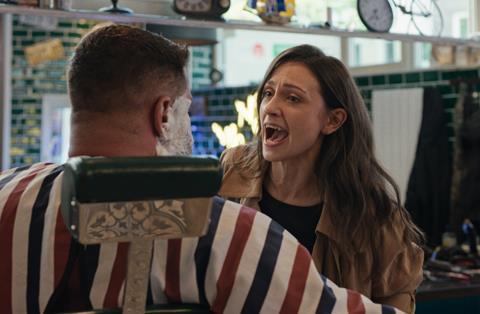The Munich premiere is a sequel to Müller’s 2009 feature ‘Wallace Line’

Dir: Franz Müller. Germany. 2025. 104mins
With the support of her family, Mira (Katharina Derr) has embarked on a new chapter in her life. She is the manager of a German supermarket, and has invested her energy and her savings into the business. Everything goes well at first, but a series of setbacks threatens to wipe out all she has worked for. This somewhat frustrating and strained drama is a sequel to director Franz Müller’s 2009 picture Wallace Line (Die Liebe Der Kinder). And while it is by no means essential to have seen the previous film, All That’s Due will likely appeal most to audiences already familiar with the complicated lives of Mira and her family.
An unshowy, workmanlike domestic drama
Müller’s 2015 Ireland-set comedy Happy Hour screened at numerous festivals including Munich, Galway and Tallinn Black Nights but, given that Wallace Line’s festival journey was predominantly within Germany, audience appetite for the further adventures of these characters will probably be keenest at home. Following its premiere in Filmfest München’s New German Cinema strand, this Cologne-shot picture could find further interest on the festival circuit but may struggle to gain much traction outside of German-speaking territories.
All That’s Due is an unshowy, workmanlike domestic drama. It is solidly acted, a story told in small-screen-friendly snippets and glimpses of the lives of its protagonists. It does, however, lean rather heavily on characters making catastrophic and frequently inexplicable lapses of judgment.
In Wallace Line, Mira was a teenager who fell in love with the son of Robert (Alex Brendemühl), the cohabiting romantic partner of her mother Maren (Marie-Lou Sellem). Sixteen years later, Mira is married to former rapper Tarik (Leonidas Emre Pakkan), whose music career has fizzled out. He takes on the brunt of the childcare responsibilities of their two girls, while Mira concentrates on growing her business. Maren is less than impressed by her daughter’s choices: “You set your sights so low,” she grumbles. “I’m happy,” retorts Mira. “If you say so,” sniffs her mother.
Mira is genuinely content for a while. She reconnects, by chance, with her mother’s former boyfriend Robert, who is now married to a Colombian woman. Robert falls back into a paternal role; he is supportive and warm in a way that Maren conspicuously fails to be. So Mira accepts when Robert offers an interest-free loan of €80,000 to help bankroll her new business.
Tarik, on the other hand, is frustrated with his lot. He regrets the missed get-rich-quick opportunity of investing in Bitcoin. He blows the entire loan impulsively, without consulting Mira, on a crypto investment that turns out to be a scam. Her marriage is in ruins and the relationship with her business partner is strained to breaking point, but Mira can’t bring herself to admit the truth to Robert. Following a fateful decision to lie, she finds herself caught up in a snowballing mess of deception.
Tarik’s decision to blow the cash without checking with his wife is unlikely, but not impossible. Scams work, after all, because people are desperate to believe there is a quick and easy route to riches. Some of Mira’s lies, on the other hand, seem inexplicable and pointless – falsehoods for the sake of plot expediency rather than for any logical reason of character motivation. Without a central kernel of character credibility, the film feels flimsy and loosely strung together, despite the best efforts of the cast.
Production companies: Mizzi Stock Entertainment, 2Pilots Filmproduction
International sales: Mizzi Stock Entertainment info@mizzistock.de
Producers: Eva-Maria Weerts, Jörg Siepmann, Franz Müller, Harry Flöter
Cinematography: Julia Daschner
Production design: Utta Hagen
Editing: Frank Tönsmann, Bigit Kämper
Music: Tonia Reeh
Main cast: Katharina Derr, Alex Brendemühl, Leonidas Emre Pakkan, Lana Cooper, Marie-Lou Sellem
























